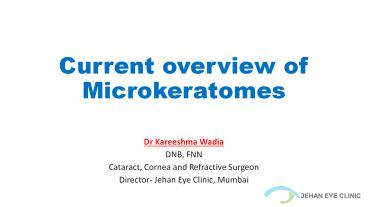Current overview of Microkeratomes - PowerPoint PPT Presentation
Title:
Current overview of Microkeratomes
Description:
Contact us for Microkeratomes, also advantages for Microkeratomes are Lower cost, Less inflammation, More efficient surgical flow – PowerPoint PPT presentation
Number of Views:20
Title: Current overview of Microkeratomes
1
Current overview of Microkeratomes
- Dr Kareeshma Wadia
- DNB, FNN
- Cataract, Cornea and Refractive Surgeon
- Director- Jehan Eye Clinic, Mumbai
2
NO FINANCIAL INTERESTS
3
PRINCIPLE
- High-precision oscillating-blade systems
- Docks to a suction ring
- Creates a lamellar corneal flap while the cornea
is held under high pressure.
4
TYPICAL COMPONENTS OF A MODERN MICROKERATOME
SYSTEM
- Console
- Motor
- Microkeratome head
- Applanator lenses
- Vacuum fixation
- Flap stop ring , which limits the microkeratome
head through the fixation ring - Foot switch
5
CONSOLE
6
MOTOR AND MICROKERATOME HEAD
- Motor of keratome initiates
- Forward movement of head
- Oscillation of blade for the cut
7
MODALITIES OF MICROKERATOME PASS
- Rotative/Pivoting flap creation
- less space needed,
- hinge placement variable
- - flap is thick thin thick
- due to the upward movement
- of the suction ring during the cut
- Hansatome, Carriazo
8
MODALITIES OF MICROKERATOME PASS
- Linear flap creation
- intraop visibility during flap creation,
- planar flap profile
- - fixed hinge position
- Amadeus, SBK
9
TYPE OF HEAD- Vertical / horizontal
10
SUCTION RING
- Suction ring will induce rise in IOP
- First step? choosing right size of suction ring
- Suction ring diameter determines
- How much of the cornea will protrude into the
microkeratome - primary determinant of flap diameter.
- Steep Cornea ? more tissue will protrude
- Flat Cornea ? less tissue will protrude
11
ALWAYS FOLLOW NOMOGRAM
12
VACUUM SETTING
- Achieving and maintaining adequate vacuum during
microkeratome pass is critical to producing
accurate flap. - IOP at least 65mmHg for most microkeratomes
- Suction system and IOP should always be checked
prior to every procedure - Lower pressures can produce thinner cuts and
irregular flaps - Higher pressures can lead to chemosis, s/c
hemorrhages, optic nerve injury
13
PLACING THE SUCTION RING
- The LASIK pneumatic suction ring is placed on the
eye. - With a suction pressure greater than 65 mm Hg,
the instrument fixates the globe at the limbus
and provides a dovetail track for the
microkeratome.
14
THE NEED FOR TRANSIENT HIGH IOP
- IOP gt65 mm Hg
- Barraquer tonometer, a conical lens with a flat
undersurface marked with a circle, and convex
upper surface that acts as a magnifier. - Dry cornea
- Gives uniform microkeratome section
15
MICROKERATOME PRACTICAL TIPS
- Counsel well before taking the patient
- Briefly explain the procedure -
- That it will take 5-7minutes per eye
- You will feel little pressure on eye
- For few seconds you wont see the lights
- Not to squeeze the eyes
- Not to move the eyes
- You will hear some noises of Keratome and the
laser machine
16
MICROKERATOME PRACTICAL TIPS
- Blade assembly and inspection
- Check suction
- Always do a trial pass before actual procedure
- Listen to sound of blade oscillation
17
MICROKERATOME PRACTICAL TIPS
- Always do marking on the cornea before keratome
pass - Advantages of marking
- Proper alignment of the flap post ablation
- In case of free flap marking will help you to
place the flap in its natural position - Also helps in identifying the epithelium and
stromal side of free flap
18
ADVANTAGES OF MECHANICAL MICROKERATOMES
- Proven history
- Lower cost
- More efficient surgical flow lt30 secs
- Ability to create flaps in anterior stromal
opacity/scar - Less inflammation
19
- Laser in situ keratomileusis was performed using
the Moria microkeratome with the - One Use-Plus SBK,
- M2 90
- M2 110 head.
The SBK head demonstrated the most accurate flap
thickness, followed by the M2 90 head and the
110 head.
20
1- No difference in visual acuity 2- Dry eye
associated with MK and DLK with femto
21
- Comparison between
- Amadeus
- Carriazo
- Moria M2
- SBK
- Nidek
- Hansatome
- CONCLUSIONS
- Variability between all 6 models
- Device labelling did NOT represent flap thickness
achieved - Thinner corneas had thinner flaps and similar for
thicker corneas - 1st cut (1st eye) had a thicker flap in B/L
procedures
22
More flap predictability in Femto
23
Thank you
- Dr Kareeshma Wadia
- jehaneyeclinic_at_gmail.com































